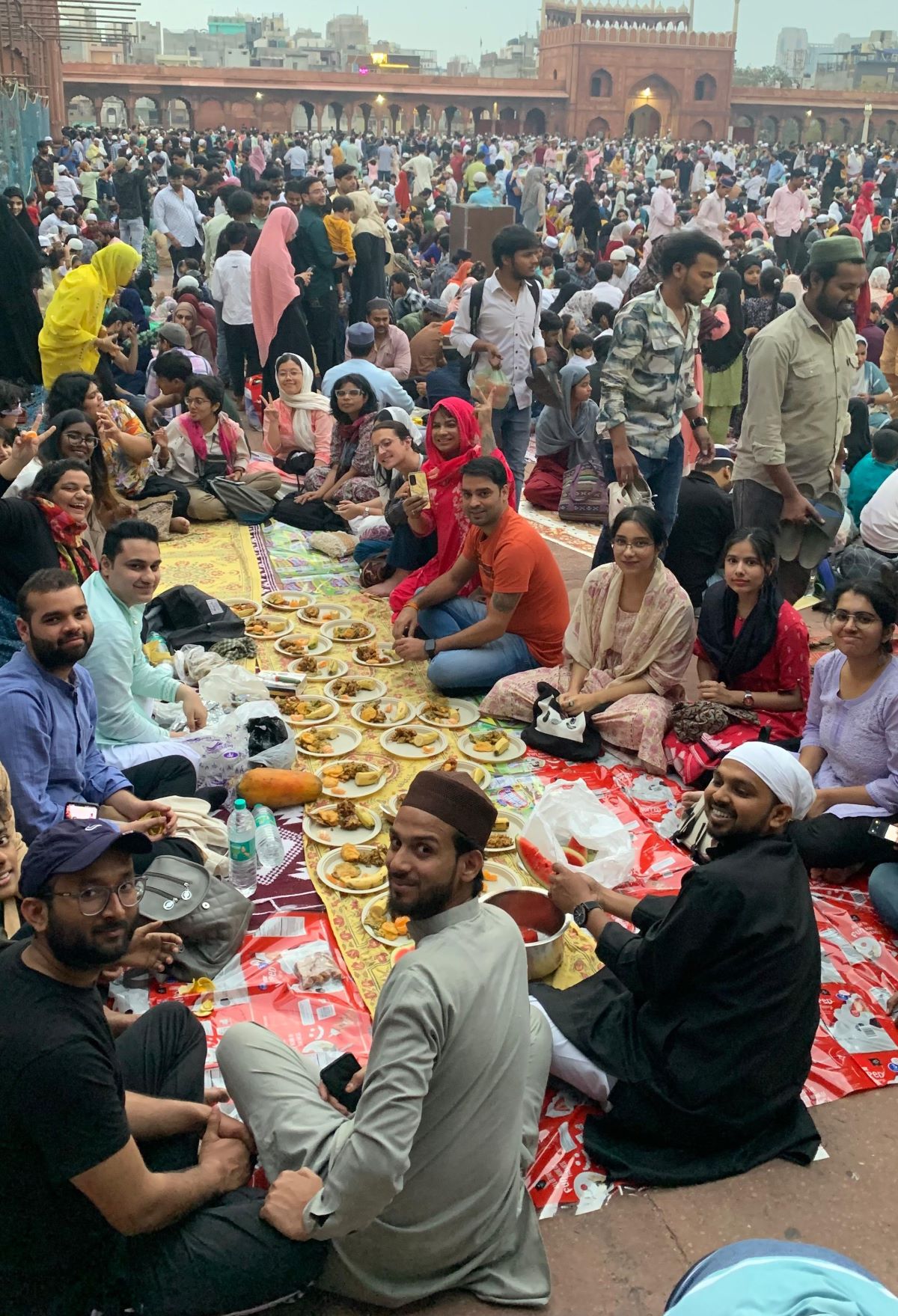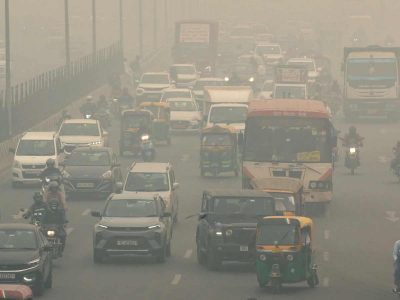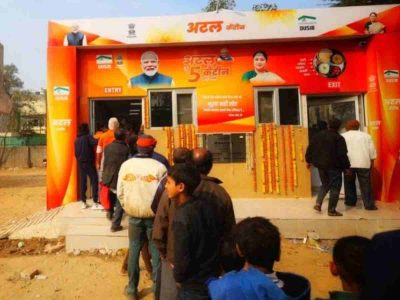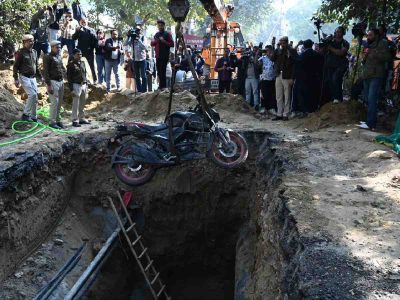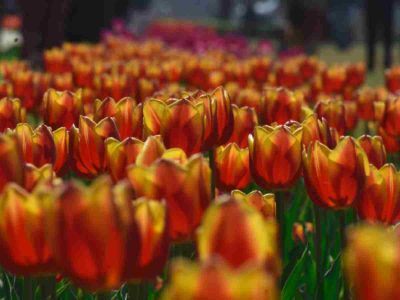Sitting in Jama Masjid’s courtyard, Iqbal Ali eagerly awaits people to join them for the Queer Iftar event.
Fondly, they (Iqbal) tell a story about a trans person in the Mughal era named Muhammad Tehsin who saw a dream in which Prophet Muhammad performed ablution while sitting at the hauz (water reservoir) of Jama Masjid.
“From that day onward, the seat where they saw the Prophet sitting and performing ablution is preserved and kept in a case out of respect for the Prophet,” Iqbal highlighted while quoting from the book Sair ul Manazil by Sangin Beg.
Iqbal is known for organising Queer or LGBTQ-friendly Heritage walks in and around Delhi, especially in Old Delhi.
This Ramadan, they ventured beyond the traditional heritage walk by initiating the “Queering Food” Walk series, Ramadan Special, with their team comprising Ayesha, Adnan, and Salman.
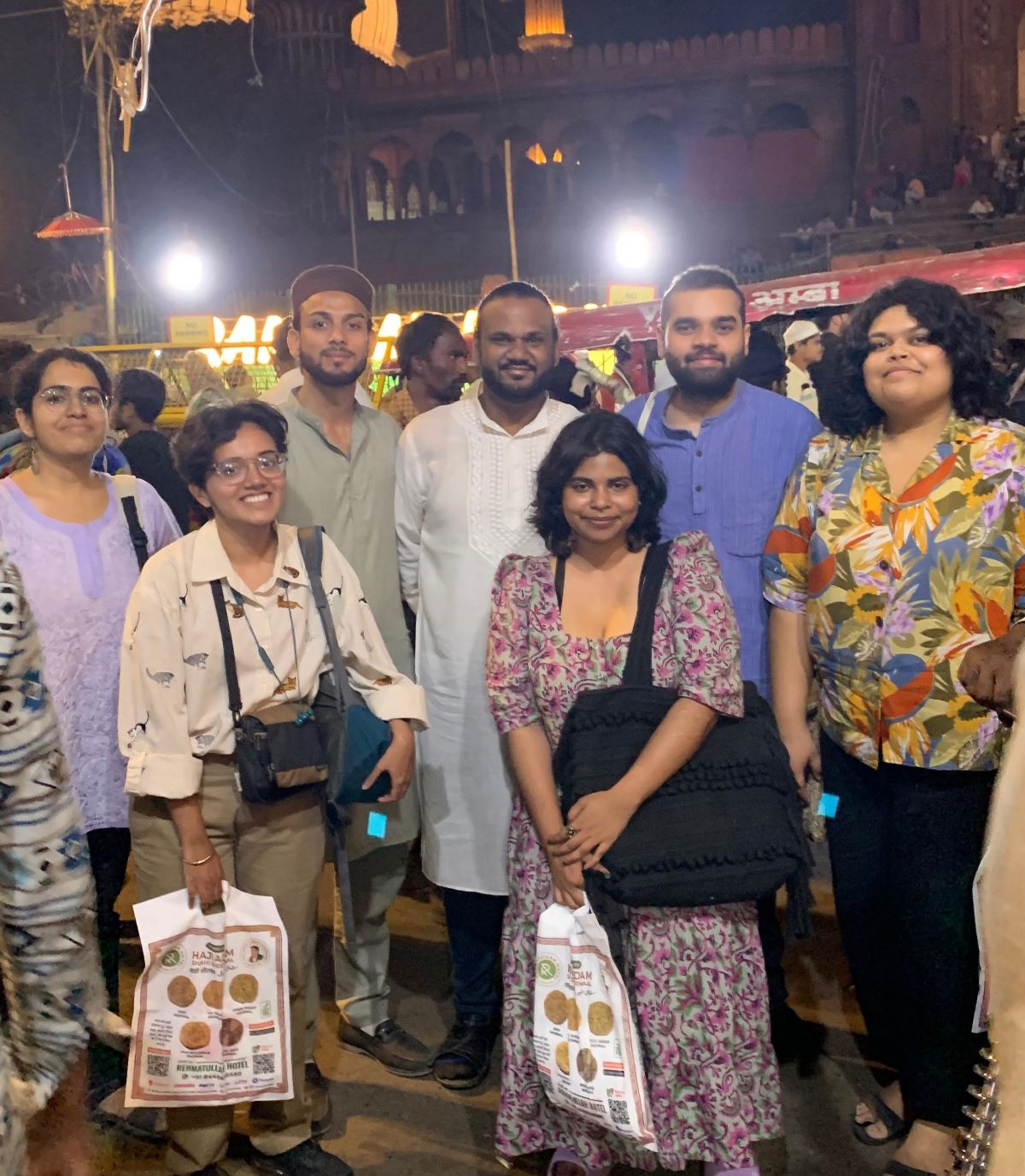
They curated four food walks and a Special Queer Iftar at Jama Masjid. The team not only welcomed all members of the LGBTQ community, but their doors were open to those outside of it as well.
The food series was started by Ayesha Nasir Alavi, a civil liberty lawyer and a resident of Shaheen Bagh. They led a food walk in their south-east Delhi locality, which has transformed into a buzzing food hub.
Following this, Iqbal and their team organised a Queer Iftar and Old Delhi Food Walk, where around 25 people turned up. They hailed from different communities with most of them belonging to the LGBTQ community, mainly Queer. However, some others joined in as sympathisers of the community.
As Iqbal welcomed at the Dastarkhwan (tablecloth), spread in the courtyard of Jama Masjid, attendees embraced a sense of acceptance amid conversations, laughter, and light-hearted banter. While some knew each other, others were new to this inclusive community.
The warmth and kindness ensured no one felt alone. Before Iftar, a brief introduction took place, after which Iqbal served everyone with Iftar delicacies, including their homemade pakoras, along with fruits, dates, and refreshing sharbat.
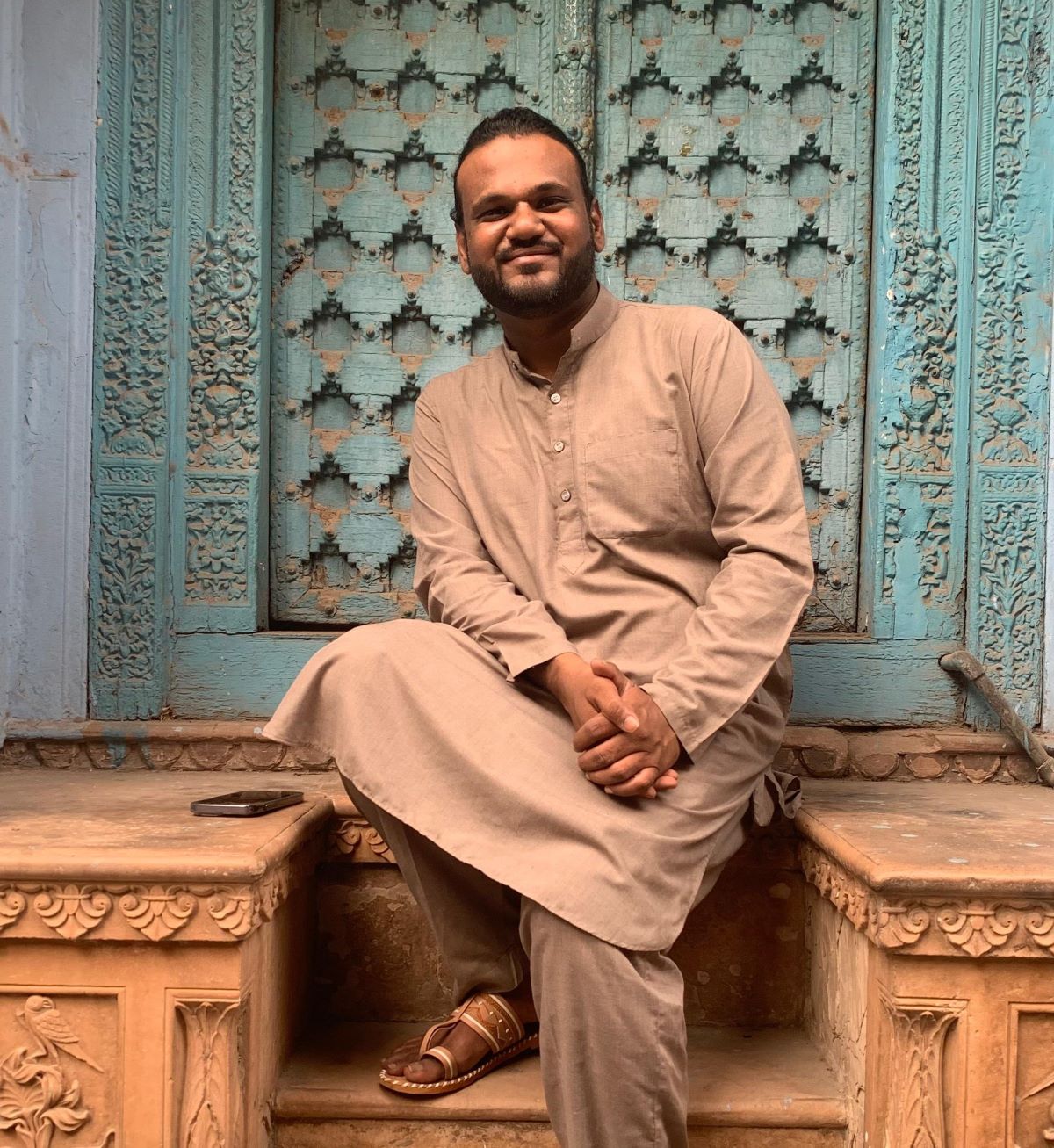
Iqbal shared their journey of embracing Islam, expressing, “Ramadan is so special for me. It’s my third Ramadan since I embraced Islam, and I feel truly blessed to be able to observe fasting and prayers during this sacred month. Additionally, I am delighted to be able to share the spiritual essence of this month with my community.
“I grew up with a very fluid understanding of religion and religious practices… As my understanding of Islam deepened, I found solace and connection in observing its rituals.”
Iqbal said that their choice of religion remains personal.
“Converting to Islam and starting LGBTQ heritage walks are two different things that happened to me at the same time in my life. My acceptance of Islam is a personal connection between me and God. But my Queerness comes before my faith.”
The visitors
Before the sound of the cannon echoed through the mosque, Karen, a queer individual of half-British and half-Indian nationality, was excited to experience their first Iftar at Jama Masjid. They eagerly waited to eat out of the special Iftar plate. As the sun set, a sense of spirituality and joy was evident on everyone’s face.
Harshul, a student from Bulandshahr studying in London, learned about Iqbal through a few friends and when they returned to India for research, decided to meet Iqbal.
Describing the experience of Iftar, they said, “It was truly a unique and beautiful experience. I have attended Iftars before, but the sense of belonging and acceptance I felt here is unparalleled. I was immensely happy to be among people from the LGBTQ community, enjoying moments where they are often unwelcome.”
Harshul further commented, “I believe Iftar embodies religious sentiments, and the days of Ramadan hold a rich religious background. People have pious and pure intentions during this month. However, when it comes to Queer identity, there is a conflict with religious identities, and there is almost no bridge between them. There isn’t much discussion about the Queer community in this religion.”
They acknowledged Iqbal’s efforts.
“I commend Iqbal for attempting to fill this space and bringing the Queer community and religion together. It’s truly beautiful. Sitting with different people from various professions such as journalism and law made the experience more lovely.”
Food for soul
After Iftar and a cup of tea, the food walk was conducted around the Jama Masjid as the participants searched for foods such as Kale Baba Kabab, Haleem, Taufiq’s Biryani, Sheermal and others.
While walking through the lanes of Jama Masjid, Belal Qureshi, a participant, shared with Patriot, “I often attend Iqbal’s heritage walks. Though I am not from the LGBTQ community, I call myself a sympathiser of this community. I want more such safe spaces for people coming from LGBTQ community.”
Shruti Hussain, a Muslim Queer woman added to the conversation saying that it’s their second visit to Iqbal’s walk and attending this doesn’t make their fear people’s judgement.
Iqbal also talked about some prominent Queer personalities of history who have shaped this city through landmarks like the Hijron ki Khanqah.
Iqbal said, “Razia Sultana also serves as a Queer icon by challenging the 13th-century patriarchy. Their tomb is also a part of our walks. They disguised themself as man to fight patriarchy.”
Iqbal added, “Here, just beside Jama Masjid, there is a Dargah of Queer Sufi mystic Sarmad Kashani who was in love with a Hindu boy from Sindh and was beheaded by the royal soldiers of sixth Mughal emperor Aurangzeb. One of my favourite Queer landmarks is the Sunehri Masjid built by a Hijra Khwajasara (eunuch) who rose to power in the court of the 14th Mughal emperor Ahmed Shah Ghazi, the son of Muhammad Shah Rangeela.”
Iqbal concluded, “There are pieces of Queer history that have been erased… My walks are an attempt to change that.”
After the successful Iftar and Food Walk in Old Delhi, Iqbal with their teammate Adnan Qureshi conducted a Ramadan Special Food Walk in Quresh Nagar popularly known as Kasabpura.
Adnan, a lawyer by profession, is a resident of Quresh Nagar and joined Iqbal only three months ago.
Adnan began the food walk by highlighting that the area is a hidden gem of Old Delhi, often overlooked despite its rich culinary heritage. This neglect may explain why the food found here remains authentic, preserving the flavours of the old era without succumbing to the changes and commercialisation seen in other food hubs.
The food walk started with buffalo heart tikka and progressed with labbe (an organ) — a dish you rarely find anywhere else in the city, buffalo chops, chapli kababs and chai served in a porcelain bowl at a 70-year-old tea shop.
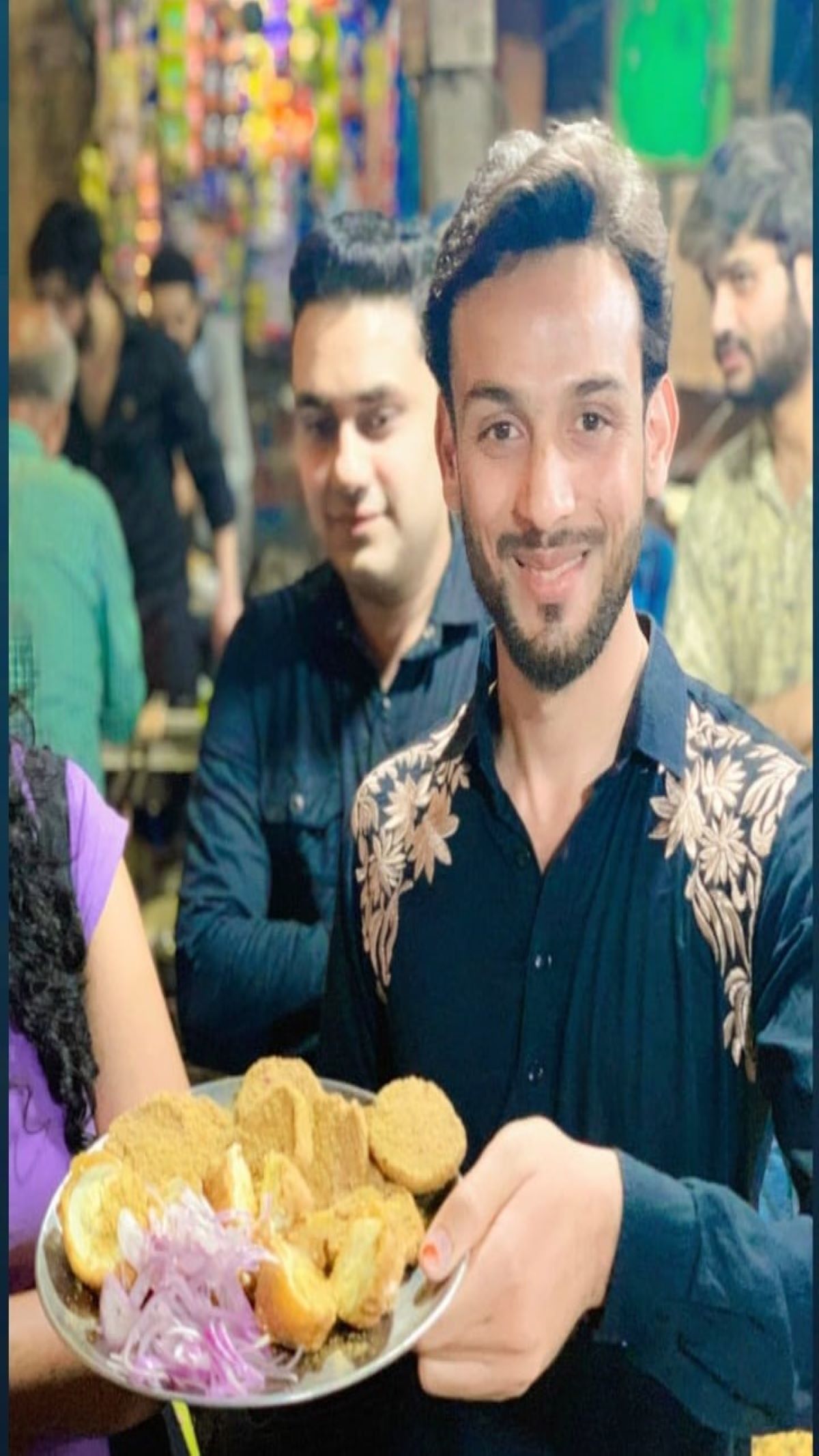
Adnan added, “The place has a rich history. Along with Shahi Eidgah, you will find a school built by Aurangzeb and paththar ki sadak (road of stones) built in their era to reach the school.”
Vaishnavi, a food blogger from Delhi, was effusive in praise of the local people.
“This was my first visit to this place. Apart from the delicious food, the generosity and hospitality of the people here are unmatched. During the four-hour walk, it felt like being at home. All the restaurant owners and shopkeepers were welcoming. I had the best food of my life here and will cherish these moments forever.”
They emphasised that the people serving food in the area treated them like their family, and preserved the traditions.
It is not that Iqbal hasn’t faced taunts from people.
“Sometimes I hear things about the way I walk. Like, ‘ye ladki ki tarah chalta hai (he walks like a girl)’. But this kind of criticism makes me feel that I am doing something very good and I am on the right path. This is also a way to show the world how a handful of people gatekeep history,” said Iqbal, who has completed 1,000 walks and is ready to wind up Ramadan walks on the coming weekend with the Ramadan Special Nizamuddin Walk.

